Lauderdale County, AL Misdemeanor Lawyers
Not enough matches for Lauderdale Misdemeanor lawyer.
Below are all Lauderdale lawyers.
James Paul Atkinson
✓ VERIFIEDAccident & Injury, Divorce & Family Law, Lawsuit & Dispute, Criminal
James Atkinson is a practicing lawyer in the state of Florence, AL.
Bradley Grant Mcnutt
International, Bankruptcy, Bankruptcy & Debt, Personal Injury, Accident & Injury
Status: In Good Standing Licensed: 26 Years
Vickie Lynn May Willard
Power of Attorney, Landlord-Tenant, Wills & Probate, Estate
Status: In Good Standing Licensed: 20 Years
Sherry Venetia Collum-butler
Lawsuit & Dispute, Estate, Business
Status: In Good Standing Licensed: 35 Years
Katherine Elizabeth Carr
Real Estate, Lawsuit & Dispute, Employment, Accident & Injury
Status: In Good Standing Licensed: 15 Years
Robert Howard Mckenzie
Government, Employment, Bankruptcy & Debt, Accident & Injury
Status: In Good Standing Licensed: 56 Years
Andrew Jay Spry
Wills & Probate, Trusts, Estate Planning, Elder Law
Status: In Good Standing Licensed: 23 Years


